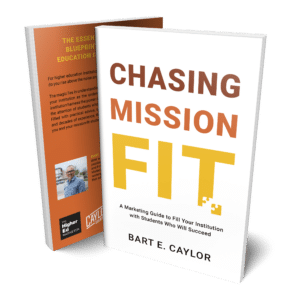Celebrating Innovation: The Key to Higher Ed Marketing Success
With all the challenges facing you every day, you’ve got to embrace change and begin to celebrate innovation. Here’s how.
Marketing Strategies
Modern enrollment pressures are reshaping what it means to succeed in higher ed marketing—so what future-ready marketing skills will your team need to keep pace?
If you lead a college or university marketing department today, you’re no stranger to pressure.
You’re being asked to drive enrollment growth while navigating shrinking budgets, shifting demographics, and rising skepticism about the value of higher education.
Add to that the rapid emergence of generative AI, the enrollment cliff, and the need to connect with a more diverse, multicultural student population—and it’s clear that yesterday’s marketing playbook won’t cut it.
And yet, there’s real opportunity in the midst of this disruption.
The teams that will thrive in the years ahead won’t necessarily be the ones with the biggest budgets or flashiest campaigns.
They’ll be the ones with the right mix of strategic skills, cultural insight, technical fluency, and mission-driven focus.
In this post, we’ll explore what future-ready marketing skills actually look like in the context of higher education and how you can begin hiring for, and training them into your team today.
Higher education has long relied on a familiar formula: well-designed viewbooks, compelling copy, email nurture campaigns, and seasonal open houses.
These were the tools of the trade and for a while, they worked.
But today, that formula isn’t enough.
The students you’re trying to reach are digital natives who expect personalized, on-demand communication.
They’re increasingly skeptical of polished messaging and more responsive to real stories and peer perspectives.
Meanwhile, institutional leaders are asking marketing teams to do more with less and prove the ROI behind every tactic.
Layer in the enrollment cliff, rising competition from alternative credentials, and the transformative impact of AI, and it becomes clear: the skills that got us here won’t get us where we need to go.
To remain effective, your team needs more than technical know-how.
They need strategic agility, cultural fluency, data-driven judgment, and the ability to adopt and adapt to new technologies without losing sight of your mission.
That’s the heart of future-ready marketing skills.
To lead your team through today’s headwinds and position your institution for long-term relevance you need more than capable communicators.
You need future-ready marketing skills that align with how students engage, how AI reshapes workflows, and how trust is earned in a skeptical world.
A: The most important marketing skills for higher education teams in 2025 include AI fluency, data literacy, inclusive storytelling, agile content creation, and strong internal communication. These future-ready marketing skills help teams navigate enrollment decline, shifting student demographics, and the rapid adoption of generative AI tools—while staying grounded in mission.
Below are the top skillsets to hire for and develop within your team today.
Generative AI is not replacing your team—but it will dramatically reshape how they work.
Teams that understand how to use AI tools for content drafting, repurposing, ideation, and segmentation will outperform teams that don’t.
AI literacy doesn’t mean all your marketers become engineers.
It means they need to understand prompt writing, editing AI-generated content, and using platforms like ChatGPT to amplify—not automate—their strategic work.
Hire for:
Train for:
The future of marketing is measurable.
Everyone on your team—from social media managers to graphic designers—should understand how your CRM connects to enrollment goals.
When teams know how to interpret metrics, segment lists, and adjust based on engagement data, your campaigns become smarter and more efficient.
Data fluency is also what makes personalization at scale possible, which is a must for meeting Gen Z’s expectations for relevance and immediacy.
Hire for:
Train for:
The incoming student population is increasingly diverse—racially, economically, culturally, and spiritually.
To connect authentically, marketers must move beyond one-size-fits-all messaging.
That means understanding cultural nuance, representing real student voices, and being able to write, design, and strategize in ways that resonate with a wide range of prospective students.

As this report in McKinsey found, Gen Z values brands that reflect their identities and speak transparently about inclusion and social impact.
Hire for:
Train for:
With content demands higher than ever, teams must be able to move quickly without sacrificing quality.
That means knowing how to adapt long-form pieces into reels, carousel posts, landing page snippets, and email hooks.
It also means designing systems where creative ideas can be pitched, tested, and deployed fast—without being bottlenecked by outdated review processes.
Agile marketing isn’t about speed for its own sake. It’s also about responsiveness, iteration, and audience alignment.
Hire for:
Train for:
Hard skills get attention. But soft skills get things done—especially in siloed, resource-constrained institutions.
Marketing team members must be able to think critically, collaborate across departments, and advocate for ideas with data and empathy.
These abilities matter even more as you work with admissions, advancement, academics, and executive leadership.
As Harvard Business Review emphasizes, emotional intelligence and strategic communication are “future-proof” traits in an age of automation.
Hire for:
Train for:
Whether it’s a new CRM, a restructured org chart, or the rollout of AI content tools, change is constant.
Resilience and openness to learning are among the most valuable qualities you can hire for and should be nurtured continually within your team.
A: Teams can prepare by developing future-ready marketing skills like prompt engineering, CRM strategy, multicultural storytelling, and change management. Training staff in these areas ensures they can use AI tools effectively, personalize student engagement, and respond to evolving institutional goals.
As workflows evolve, your people will need support, clarity, and psychological safety to grow alongside the tools.
Hire for:
Train for:
No skill, tool, or tactic can thrive in a culture that resists change or stifles creativity.
One of the most overlooked components of future-ready marketing teams isn’t technical at all—it’s cultural.

A healthy internal culture gives your team the space to experiment, reflect, and improve.
It welcomes new ideas without defensiveness. It makes room for people to ask hard questions, give honest feedback, and try new tools without fear of failure.
If your team feels overextended, undervalued, or disconnected from institutional purpose, even the best strategies will fall flat.
That’s why investing in your culture isn’t a “soft” strategy. Rather, it’s a foundational one.
When your culture is grounded in trust, purpose, and growth, your team becomes more resilient and more effective.
And your culture is something other schools simply cannot copy.
The enrollment cliff, the rise of AI, and the evolution of student expectations aren’t passing trends—they’re the new reality.
To lead in this environment, your team needs more than marketing experience.
They need future-ready marketing skills rooted in strategic agility, data fluency, cultural awareness, and mission alignment.
A: Leaders should prioritize future-ready marketing skills such as adaptability, curiosity with AI tools, cross-cultural fluency, and strategic thinking. Building a team with these traits—and supporting them with a healthy, mission-driven culture—creates long-term resilience and marketing impact.
That might mean updating your hiring process to prioritize adaptability over credentials.
It could mean building new onboarding pathways for AI tools and inclusive messaging.
It might even look like rethinking what “success” looks like for your team—not just in output, but in growth, cohesion, and strategic clarity.
Because at the end of the day, it’s not just about filling roles or checking boxes.
It’s about building a marketing team that can navigate uncertainty, tell your institution’s story with authenticity, and engage the students you’re truly called to serve.
Ready to Build a Future-Ready Team?
If your marketing team is navigating AI, enrollment pressures, or evolving student expectations, we can help you move forward with clarity.
At Caylor Solutions, we offer custom training built for higher ed marketers from foundational AI skills to advanced content strategy.
A 6-hour virtual training (split over two days) that covers:
Need broader support? We also offer training in marketing strategy, content workflows, and team development tailored to your institution’s goals.
You don’t need more pressure. You need the right skills, tools, and mindset to lead with confidence.
The essential marketing book every higher education institution needs! If you are a higher education marketing professional seeking a fail-safe plan to make your institution stand out, “Chasing Mission Fit” is your guide.
 Discover how to:
Discover how to:
So you can empower your institution with audience-focused marketing strategies, and attract mission-fit students who will flourish in your unique academic environment.
Ready to transform your institution’s marketing approach?
Order now!
Images via Midjourney
Subscribe to The Higher Ed Marketer podcast today!